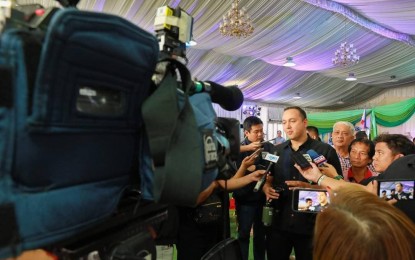
LOVE FOR MOTHER EARTH. Taguig City Mayor Lino Cayetano leads the launch of the city's Zero Waste Plan at the Lakeshore Tent in Barangay Lower Bicutan on Friday (Feb. 14, 2020). Under the program, the city envisions itself to be a zero-waste locality by reducing its solid waste by 80 percent within the next three years. (PNA photo by Lloyd Caliwan)
MANILA -- Love makes the world go round. But as climate change and related issues continue to break the heart of the planet, people, governments and institutions make small but meaningful moves to fix and heal it.
On Valentine's Day, the city government of Taguig strengthened its resolve to nurturing the environment through its commitment to reduce its solid waste by 80 percent within the next three years which would help its goal of becoming a zero-waste locality.
This, as it unveiled its Zero Waste Plan, an integrated program that introduces measures to reduce solid waste and improve waste management, leading up to an 80-percent solid waste diversion, or reduction in waste going to landfills and dumpsites, by 2023.
“The zero-waste city is the pinnacle of our green governance agenda, so we will pull all the stops to make this target a reality,” Mayor Lino Cayetano told reporters after the program's launch at the Lakeshore Tent in Barangay Lower Bicutan.
The move aims to contribute to overall health and wellbeing in Taguig, address water and soil contamination, and reduce air pollution.
It will also create employment opportunities and curb flooding in many areas which will yield higher productivity and greater economic development.
The unveiling coincided with the first quarterly meeting of the Taguig City Solid Waste Management Board for this year, where some 150 barangay and city leaders discussed the Ten-Year Solid Waste Management Plan that was rolled out in 2014 and the state of all the city’s materials recovery facilities (MRFs), which will play a key role in the zero waste roadmap.
The Zero Waste Plan scales up successful efforts in Barangay Fort Bonifacio, which now stands as a model community.
To further strengthen this program, the city government also announced to establish a Sustainable Livelihood Office that will help look for sustainable alternatives, in the event attended by city environment committee heads, barangay and Sangguniang Kabataan (SK) chairs and cluster heads.
All succeeding infrastructure projects of the city will also have an MRF.
The waste collected and brought at MRFs goes toward composting for plants, repurposing for community gardens, and landfills.
A technical working group that will survey all 28 barangays for the appropriate land for the facilities will be formed for this purpose.
Taguig will also join global efforts to phase out single-use plastics. Citizens are encouraged to use canvas bags or eco-bags as an alternative to plastic bags when shopping for sundries such as meat, fruits, and vegetables.
Cayetano urged each barangay captain to take the lead in their communities for this initiative with the city committing to provide training and support.
"The key to this is information dissemination. Focusing on segregating-at-source, every household, school, business in Taguig will be taught how to properly manage their trash," said Cayetano.
He also rallied for the support of the Taguigeños for the success of the program.
“We are pledging our full support to the Zero Waste Plan. We will make sure all the barangays implement everything in it. We will also onboard experts and build all the required hardware to make our beloved city truly green," he added.
Meanwhile, funds collected from the city's recycling efforts will be used to build classrooms, low-cost housing, and other infrastructure projects and provide financial assistance to teachers and police officers in the city.
He said the city is determined to see that every barangay will have diverted solid waste from landfills and dumpsites by 80 percent in the next three years.
“We are launching this plan ultimately to teach Taguigeños to own up to the waste they produce and to always choose green alternatives. The Earth is currently very sick, and we have to do our part. This is to leave behind a city that our children and their children will be proud of," he said. (PNA)
